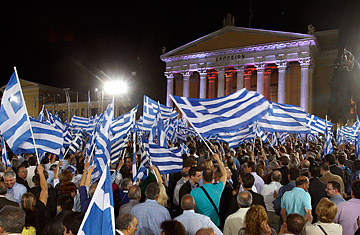
Greek New Democracy party supporters wave flags as they listen to their leader Antonis Samaras during a pre-election rally in Athens on May 3, 2012
In a show of anger at meddlesome foreigners, more than 60% of Greeks voted for antibailout parties in Sunday's parliamentary elections. The top vote-getter was still an established organization, the conservative New Democracy party, which supported the bailout. However, it did not have enough seats to govern alone and, on Monday, its leader Antonis Samaras failed to form a coalition. And so Greece is now turning to the charismatic leader of the buoyant leftist party that came in with the second most seats.
On Tuesday, Alexis Tsipras vowed to form an antibailout governing coalition that he said would aim to cancel the harsh austerity measures imposed on the country by international lenders. He also said he would nationalize the country's banks. "The popular verdict clearly renders the bailout deal invalid," said Tsipras, 37, an engineer who leads Coalition of the Radical Left, or Syriza. But can he really form a working government?
Syriza has already said it won't work with New Democracy or PASOK, the once mighty socialist party that ran Greece for many of the past 30 years but came in an embarrassing third in Sunday's elections. Tsipras said he would only work with the two parties if they unreservedly rejected the bailout deal. "If they truly regret what they have done to the Greek people," he said, the two party leaders should rescind their letters to creditors that guaranteed full support of the bailout terms.
Tsipras, whose party won 52 seats in the 300-seat Parliament, also said he wanted coalition partners to discuss abolishing a law that gives members of Parliament immunity from prosecution. He also pressed for an investigation into Greek banks and the establishment of an international auditing committee to investigate the causes of Greek debt.
For all his enthusiasm, Tsipras is unlikely to win enough support to form a governing alliance of leftist parties, the first such coalition in Greek history. The Communist Party of Greece has already said it won't join such an alliance. If Tsipras fails to form a government, the next party to try to form a coalition will be PASOK. If it fails, there will be new elections next month. That's the most likely outcome, says Platon Tinios, an economist at the University of Piraeus. "Everyone is pretending to form a government but what they're actually doing is preparing for elections again," Tinios says. "You need some time for political development to avoid the gridlock and the chaos that we're seeing now, but that's never going to happen if you're forever chasing the next election."
Giorgos Kountaroudis, 32, an architect in Athens, says he hopes new elections will drive out the most extreme parties, especially the ultranationalist neofascist Chrysi Avgi, or Golden Dawn, which won almost 7% of the vote and at least 21 seats in Parliament. Party members give Nazi salutes, and supporters have been linked to violent attacks on the many undocumented immigrants living in Athens. Golden Dawn's rabid anti-immigrant and antibailout campaign seemed to resonate with disenfranchised Greeks, especially the young, but Kountaroudis says he hopes the party's showing "was just a crazy bubble. I don't want to believe that so many people would vote for Nazis." He voted for Drassi, a probusiness centrist party that didn't win enough votes to get seats in Parliament.
Centrist parties are planning to combine forces and may have a better shot in the next elections, which will likely be more conclusive than the ones on Sunday, says Kevin Featherstone, a professor of contemporary Greek studies at the London School of Economics. "On Sunday, what the electorate wanted to do was punish. But in the next stage, they're going to want to vote with solutions in mind," Featherstone says.
In considering those solutions, politicians must also be realistic about the dilemma Greece faces with the bailout terms, he says. Though the votes in Greece and in France certainly rocked the euro zone's austerity politics, Featherstone says the maximum Greece can expect from the E.U. are "modest adjustments" on the memorandum of agreement between Greece and its international lenders. Greece has received two bailouts totaling about $320 billion from the E.U., the European Central Bank and the International Monetary Fund. Its government also pushed through a massive bond swap with private creditors in March that cut Greek debt by about half.
"The bottom line is that the money Greece needs to cover its debt and public sector all depends on the memorandum," Featherstone says. If Greece doesn't keep cutting its budget according to those terms, it will likely run out of money by the end of the month, setting up the country for a disorderly default and a possible exit from the euro zone.
"It is obvious that if the Germans do not shift from their positions and if there are no convincing solutions in our country, [Sunday's] vote will be harbinger of the drachma," wrote Alexis Papachelas, editor of the Greek daily Kathimerini. "The arguments in favor of fighting for the euro have to be set out."
But it's hard to know who will make those arguments since Sunday's elections virtually crushed Greece's political class. PASOK is now in ruins, and a chastened New Democracy is struggling to keep itself together. Papachelas said Greece will face tough times in the days and months ahead as the country struggles to find a replacement for a rotten political system that has collapsed. Kountaroudis, the architect, says he's happy to see that system go, even if it takes the euro with it. "We had good times, yes," he says, "but maybe we just weren't ready for the euro."
